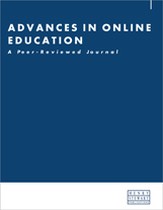Personal and engagement factors in remote learning contributing to high student achievement in a transnational education context: A quantitative study
Abstract
Remote learning, adopted by many institutions as a temporary measure during the COVID-19 pandemic, has been found to be a viable option in many educational settings, including transnational higher education. Remote learning makes extensive use of technology such as virtual learning environments (VLEs) and video conferencing applications. Understanding how these tools can be used to predict students’ academic performance has brought huge benefits to both students and educators. The main determinant of student success is revealed to be personal factors/individual differences that are yet to be investigated. Taking exam performance as an outcome variable, this research utilises a BSc pharmaceutical course student perception on a survey to quantitatively identify the personal factors that contribute to academic achievement through the construction of a new X variable. The findings confirm that page views values operate as a simple one-to-one predictor of exam performance regardless of student cohort. In a holistic model, days since last log in, and practical and coursework marks had a high influence on the generated equations. Additionally, self-study skills, note taking and interest in the subject matter as personal factors were found to be key determinants of student engagement in remote settings. Conversely, less engaged remote learners appeared to struggle with motivation and keeping up to date with their studies, relying to a high extent on teacher support and university facilities during their learning journey. For the first time, this paper addresses personal factors contributing to success in remote learning settings using mathematical modelling and machine learning, thereby avoiding subjectivity and bias in assessment. The findings will be of use to designers of remote learning in general, and more specifically in transnational education.
The full article is available to subscribers to this journal (subscription is free).
Author's Biography
Taher Hatahet is currently a Senior Lecturer in the School of Pharmacy at Queen’s University Belfast. His pedagogical research focuses on developing active and engaging learning context for pharmacy students, while his lab work is in the area of nanomedicine. Taher is a Syrian registered pharmacist. He completed his Bachelor of Pharmacy degree in Syria from Arab International University in 2013. Following receipt of the prestigious Erasmus Mundus Avempace 2 Award from the European Union commission, he started his PhD in the Institut Charles Gerhardt Montpellier (ICGM), France. Within the research team of advanced materials for health and catalysis, his PhD research project focused on developing novel lipid-based nanoformulations and nanocrystals for the delivery of antioxidants through the skin. In 2016, Taher joined University of Rennes 1, School of Pharmacy as a research and teaching fellow focusing on polymeric nanoparticles for delivery of inorganic photosensitising agents for the theranostic management of ovarian cancer. In May 2018, he joined Queen’s University Belfast School of Pharmacy as a lecturer in pharmaceutical sciences.
Ahmed A. Raouf Mohamed received his BSc and MSc in electrical and control engineering from the Arab Academy for Science and Technology, Cairo, Egypt, in 2013 and 2017, respectively. In January 2019, he joined the Energy, Power and Intelligent Control research cluster of Queen’s University Belfast (QUB), Belfast, UK, as a researcher as part of the EU SPIRE 2 project. He received his PhD degree in electrical and electronic engineering from QUB in July 2022. His research interests encompass not only electrical engineering but also the utilisation of machine learning and prediction models for various educational objectives, such as evaluating students’ performance and progress.
Maryam Malekigorji is a pharmacist and pharmaceutical scientist presently serving as a Senior Lecturer in medical sciences at Queen Mary University of London. She holds an Advance HE Senior Fellowship and has previously served as a Programme Director in Pharmaceutical Sciences at Queen’s University Belfast. Maryam’s current scholarly activities focus on exploring students’ academic performance and perspectives on the learning experience, particularly associated with blended and active learning strategies.
Caoimhe Clerkin received her PhD in biopharmaceutics in 2018 from the School of Pharmacy, Trinity College Dublin. Following this, she took up a position as a postdoctoral researcher within the Department of Molecular Medicine at the Royal College of Surgeons, Ireland. In 2019, she was appointed as a Lecturer within the School of Pharmacy at China Medical University – Queen’s University Belfast Joint College (CQC), located in Shenyang, People’s Republic of China. Here, Caoimhe contributes to the development of new and innovative curricula for pharmaceutical and biotechnology students. As a result, she is involved in pedagogical research to understand and stimulate a higher level of cognitive learning by investigating students’ attitude to scientific subjects, the Impact of student co-designers on their own curriculum (in partnership with Queen’s University Partnership Programme) and understanding students’ requirements for online transnational education. This research has the potential to foster a commitment to lifelong education in students, to help them to work efficiently and effectively within a multidisciplinary team and provide them with the required skills to become world leaders in healthcare provision.
Liane Sandrey works in the field of English for academic purposes (EAP) and is currently a lecturer at the University of Ulster, Belfast. She holds an MA in applied linguistics and has extensive teaching experience across a diverse educational landscape, including Poland, Japan, New Zealand and the United Arab Emirates. Liane’s scholarly interests centre around teaching and learning collaboration and student motivation and engagement.
Citation
Hatahet, Taher, Raouf Mohamed, Ahmed A., Malekigorji, Maryam, Clerkin, Caoimhe and Sandrey, Liane (2024, June 1). Personal and engagement factors in remote learning contributing to high student achievement in a transnational education context: A quantitative study. In the Advances in Online Education: A Peer-Reviewed Journal, Volume 2, Issue 4. https://doi.org/10.69554/BBRA6900.Publications LLP
